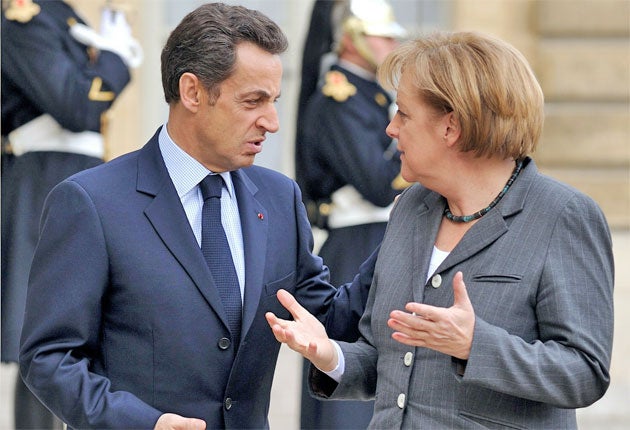Franco-German relations cool over eurozone crisis

Minutes before President Nicolas Sarkozy was to leave to fly to Berlin for a Franco-German summit, Chancellor Angela Merkel telephoned to postpone the meeting.
Officially, the cancellation was forced by a timetabling problem. Chancellor Merkel was embroiled in her emergency plans to cut €80bn (£66bn) from the German budget by 2014. In truth, the postponement is evidence that the Franco-German partnership, which has steered the European Union for half a century, is struggling to survive one of the worst crises in the history of the EU.
The Merkel-Sarkozy meeting was supposed to agree a joint position on the deficit crisis threatening the European single currency before a European summit in Brussels next Thursday. Officials in both France and Germany say that the two countries were so deeply divided that a meeting on Monday would have been pointless and failure might have caused a further market backlash against the euro.
Efforts will be made to identify at least some common ground before the postponed Franco-German summit takes place in Berlin next Monday. Personal relations between the two leaders are now so strained, however, that the new EU Council President, Herman van Rompuy, has had to be employed on occasion as a peacemaker and message-carrier.
Both Chancellor Merkel and President Sarkozy say that there should be a "European economic government" to narrow policy differences between countries using the euro and enforce the deficit and debt rules which have been trampled by all countries, save Luxembourg, in recent years. Paris and Berlin remain deeply opposed, however, on what "European economic government" should mean.
President Sarkozy wants to give increased political power to the informal eurogroup of the 16 countries which use the single currency. This consultative forum would become a de facto economic government overseeing national fiscal and spending policies.
Chancellor Merkel detests the idea of a powerful eurogroup dictating budget policy to Berlin. She wants decisions to be made by all 27 EU countries. She also wants tougher deficit-enforcing rules, including the power to force backsliding countries to go bankrupt rather than demand financial help from their partners. France hates this idea.
The Franco-German disagreement is not the first in the last 50 years but is potentially the most serious. The personal chemistry between the mercurial, tactile President Sarkozy and the stolid, unemotional Chancellor Merkel has never been good. But there has also been a wider divergence in German and French viewpoints and interests, which has been exposed by the debt and euro crisis.
The French press, and some French politicians, accuse the Germans of taking a narrow, national approach, which has, in the end, made the crisis worse. After refusing for many weeks to join a concerted but limited Greek bailout, Chancellor Merkel was forced by market pressure to agree a much larger, €500bn aid mechanism, they point out. The German press and politicians, no longer think in European terms, the French complain.
In Germany, France is accused of conspiring with the (French) head of the European central bank, Jean-Claude Trichet, and the French head of the International Monetary Fund, Dominique Strauss-Khan. Paris has bullied Ms Merkel, the German press complains, into conceding ground which suits French interests.
Reports in the Spanish press that Mr Sarkozy threatened to pull France out of the euro last month unless Ms Merkel conceded on the bailout mechanism for Greece have been denied in both Paris and Madrid. In the German press, the reports are taken to be "metaphorically" true, if not strictly accurate.
The chances of any agreement on long-term reforms of the political machinery of the euro next week are slender, French officials say. "The negotiations have not been going well," one senior French official told Le Monde. "The Germans have not been prepared to move forward."
Even the €80bn package of spending cuts agreed by Ms Merkel is an irritation and an embarrassment to Paris. France's budget deficit – 8 per cent of GDP – is higher than Germany's but Paris has so far announced only €15bn in cuts and an uncosted plan to bring its deficit within the official euroland limit of 3 per cent by 2013.
Join our commenting forum
Join thought-provoking conversations, follow other Independent readers and see their replies
Comments
Bookmark popover
Removed from bookmarks